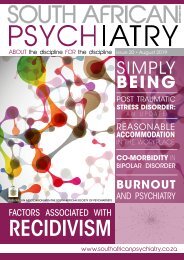South African Psychiatry - November 2020
South African Psychiatry - November 2020
South African Psychiatry - November 2020
Create successful ePaper yourself
Turn your PDF publications into a flip-book with our unique Google optimized e-Paper software.
PERSPECTIVE - LEGAL
LABOUR COURT FOUND DISMISSAL TO BE
AUTOMATICALLY UNFAIR
The Labour Court held that at all relevant times,
the employer was aware that the employee was
suffering from depression and that the employer
failed to consider his mental state at the time
of misconduct. Therefore, the true reason for
the dismissal was the employee's mental illness
and not the alleged misconduct. The Labour
Court found that dismissal of the employee was
automatically unfair in terms of section 187(1)(f) of
the Labour Relations Act 66 of 1995 as amended
(LRA) and that the employee had been unfairly
discriminated against on the ground of suffering
from depression, in terms of section 6 of the
Employment Equity Act 55 of 1998 as amended.
LAC OVERTURNED LABOUR COURT'S
DECISION
On appeal to the LAC, the employer's main
contention was that the employee was dismissed
for misconduct and not depression. The employer
also argued that the employee failed to establish
a causal link between his depression and the
misconduct that led to his dismissal.
THE LAC STATED THAT THE KEY QUESTION
TO BE ANSWERED, WHERE AN EMPLOYEE
CONTENDS THAT HIS ACTIONS WERE
CAUSED BY DEPRESSION, IS WHETHER THE
DOMINANT OR PRIMATE REASON FOR
HIS DISMISSAL WAS HIS MISCONDUCT
OR HIS DEPRESSION.
The LAC commented that depression must be
looked at as a form of ill health. A depressed
employee may be dismissed for incapacity in
terms of items 10 and 11 of the LRA's Code of Good
Practice: Dismissal. Alternatively, depression may
play a role in an employee's misconduct so much so
that an "employee may not be liable for misconduct
on account of severe depression impacting on
his state of mind (cognitive ability) and his will
(conative ability) to the extent that he is unable to
appreciate the wrongfulness of his conduct and/or
is unable to conduct himself in accordance with an
appreciation of wrongfulness". The employee bears
the evidentiary burden to provide the factual basis
of this defence.
The LAC found that the evidence showed that the
employee did suffer from depression. However, the
employee failed to present compelling evidence to
show that he was dismissed for being depressed.
Due to the nature of the employee's misconduct,
the employer therefore had a legitimate reason for
instituting disciplinary proceedings against him.
The LAC further found that while it might have been
the case that but for his depression, the employee
may not have committed some of the misconduct,
he failed to present evidence to show that the
cause of his dismissal was his depression. The
reason for the employee's dismissal in this matter
was his misconduct and not his depression.
THE DECISION OF THE LABOUR COURT
THAT THE EMPLOYEE'S DISMISSAL WAS
AUTOMATICALLY UNFAIR AND AMOUNTED
TO UNFAIR DISCRIMINATION WAS
THEREFORE SET ASIDE.
Although the LAC overturned the Labour Court's
decision, the LAC nevertheless noted the following -
"Depression, sadly, is a prevalent illness in the
current environment. Employers have a duty to deal
with it sympathetically and should investigate it fully
and consider reasonable accommodation and
alternatives short of dismissal."
This case is an important reminder to employers on
two fronts -
• EMPLOYERS HAVE A DUTY TO
CONSIDER THEIR EMPLOYEES' MENTAL
HEALTH
• EMPLOYERS SHOULD EXERCISE
CAUTION WHEN CONSIDERING
DISCIPLINARY ACTION AGAINST
EMPLOYEES WITH MENTAL HEALTH
ISSUES
Employers should be careful when determining
whether an employee’s conduct amounts to
misconduct or whether there is a causal link
between the conduct and mental illness. This
will also assist an employer in its decision on the
appropriate course of action
From Weber Wentzel, Left to right: Mpumelelo Nxumalo, Kgololego Pooe and
Shane Johnson
For further information contact:
Nadine Van Tonder
TS COMMUNICATIONS
T: +27 11 894 2767 | C: +27 72 707 4919
94 * SOUTH AFRICAN PSYCHIATRY ISSUE 25 2020
















